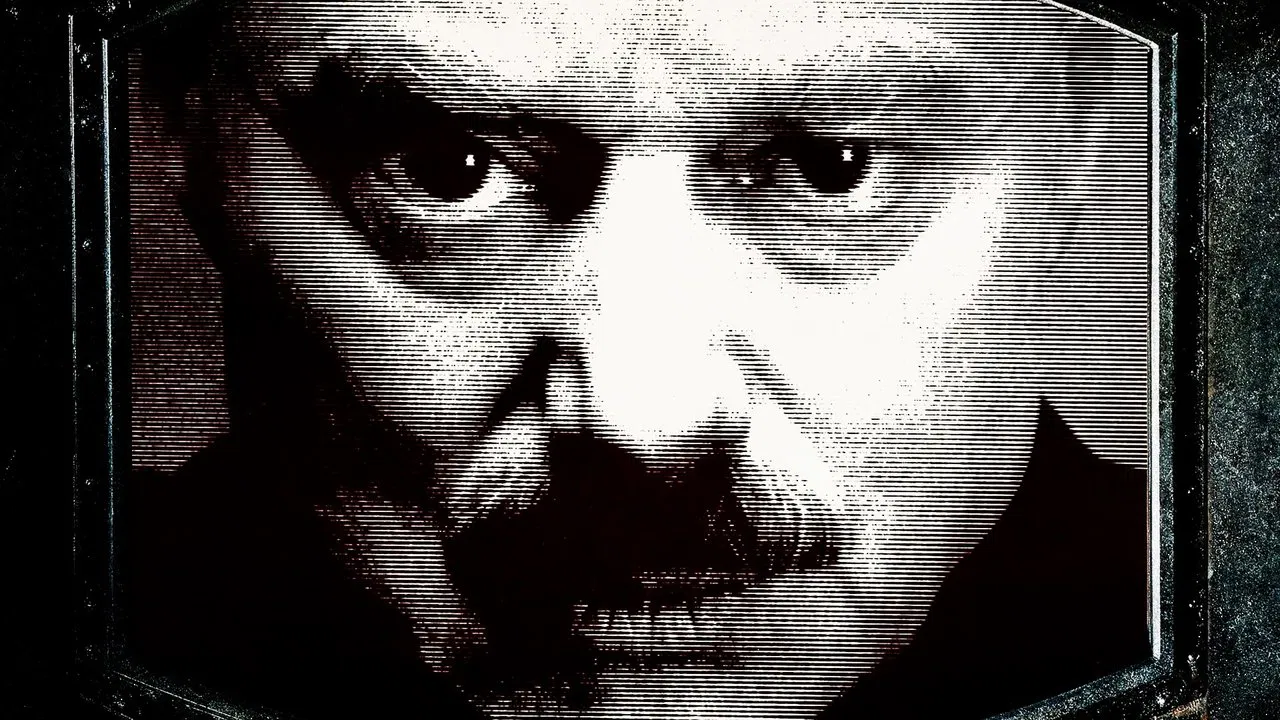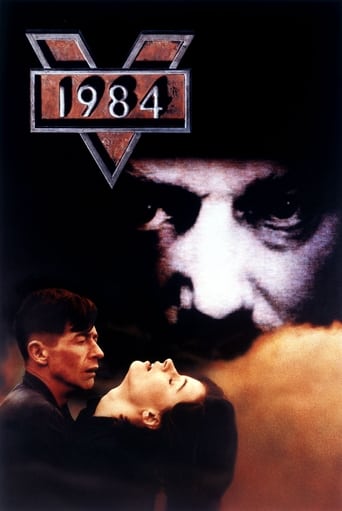

Many years back, I got chatting to a man in a pub. We got chatting about things we liked and disliked. One of the things I told him was that I was a massive fan of Gregor Fisher. It was then that he recommended this film to me. His exact words were: ''It's ideal viewing for Gregor Fisher fans!''. With this, I duly gained a copy and tuned in. Sadly, as the end credits rolled, I came away feeling greatly disappointed.'1984' ( made the same year ironically as it's title ) is based on George Orwell's 1940's novel of the same name. John Hurt was leading man Winston Smith. I won't even bother to describe the plot as I am sure many are already familiar with the book.I really could not follow the film at all. Much of what was in the book clearly did not make it to the screen ( the film would have been too long otherwise ) but it seems much of what was left out was the more vital parts which would have the film semi-logical.Aside from boring me, much of the movie got my blood boiling. For instance, the scene in which a member of the Thought Police punches Julia in the stomach had me seething with anger!John Hurt is extremely robotic as Winston and Suzanna Hamilton failed to do much better as Julia. Richard Burton was in ill health at the time and died shortly after production so his performance seemed somewhat tired. Gregor Fisher did his best with the little he was given ( I know, I'm biased ) but his efforts were in vain. The worst offender in the cast was Cyril Cusack as the two-faced Mr. Charrington.I don't denounce those who like this film. If it is your bag, then more power to you. Personally, it is just not my cup of tea.
... View MoreI never read a book and never watched the old version. This movie isn't only about war and power, its about the human's original thought and psychological. It really touch the corner my heart for its beautiful storytelling. The movie is successful to show such complexity of human thought and psychological strength. The beginning of the movie is not much appealing and not much entertaining but it's engaging. And the climax scene has everything.2+2=? the question not much as simple as it used to be. it's feel so unusual but it's very natural for me. We experienced these things in our life and now we used to it. 2+2=4 if it's approved math.I love it.
... View MoreWhen George Orwell's publication of "1984" was distributed in 1949, it was not too long after the creation of two separate governments for Korea, as it was divided among the Democratic People's Republic of Korea of the North and the Republic of Korea in the south. South Korea is a moderate presidential republic. North Korea is the very nightmare Orwell's novel depicts. It is totalitarianism to the full definition of its own conception. The "Eternal" president and the general secretary are Kim LL Sung, and Kim Jong LL. Corpses in leadership essentially. The current president is Kim Jong UN, or as Bill Maher calls him, Kim Jung Pugsley. Little humor is to be derived from such a comparison, when really pity and sorrow is a more appropriate reaction to the citizens who live under the regime of North Korea, with little freedom, or rarely any individuality in their existence. The same can be said for the people of Ocenia as they praise their ever loving Big Brother, for whatever greater good the party of Insoc (English Socialism) has declared. The details never matter, for the purpose of totalitarianism in its nationalistic intentions is to promote ignorance, and to discourage all forms of independence with the ultimate goal to be that of slavery, masked as loyalty. Winston Smith (Hurt), a frail, and subtle loner, lives a pathetic and empty life in his methodical existence. His profession consists that of a worker at the ministry of truth, rewriting history, and preventing any essence of truth from reaching the surface of an ongoing war. He attends daily meetings of erratic praise, as many of the blue collared workers of the both the inner and outer parties praise the image of Big Brother, their all powerful and omniscient ruler. There is not a street corner where Big Brother's face isn't shown, or a room with a television screen of his bulgy focused eyes locked dead onto you. Children are recruited into groups known as the thought police, breeding suspicion among those they supposed to be thought criminals, as in those who commit the crimes of thinking. Friends, family, neither matters, anyone guilty of thought crime is considered an enemy of Big Brother and subjected to re-education therapy. Winston's world is forever changed when he receives a letter from a women named Julia (Hamilton), saying "I love you." Perplexing at first, and odd to the degree of such a confession, but with the curiosity of his wondering spirit, Winston pursues Julia to the point where they begin a forbidden affair, experiencing the sexual pleasure and the emotional love their society tirelessly works to prevent. As their love affair becomes more intimate, there comes an even greater understanding to Winston and his past, feeling regret for the sins of his childhood, and the doubts he holds to this day in being a human being, and remaining one against an evil as threatening as totalitarianism One of the central themes of 1984, aside from its direct opposition to nationalistic totalitarianism, is that it is an examination that tackles both the beautiful and the equally horrible parts of the human soul. Through the character Winston, there comes an unraveling of the certain extents that human nature represents. There are two sides to the fragile and well-meaning Winston. Through his love affair with Julia, comes the gentle and benevolent side that is still discovering the concepts of beauty and happiness, forsaking the absurd notion of purity and embracing the tranquility of an old woman singing as though these were peaceful times. Then comes the cowardly and terrified side to his persona. It is a side that only those that haven't read the novel will find surprising in the dark revelations regarding the human condition. It is mostly shown through the chilling performance Richard Burton gives as O'Brian. As a member of the inner party, O'Brian lives a more comfortable lifestyle, being mysterious and cunning in his remarks. He gives Winston dreams of hope, while raising suspicions in the audience. It is a brilliant performance that manifests a cold representation of the human being's utter indifference towards suffering, mostly generated and beaten by a similar means of past suffering. Anyone who picks up a copy "1984" can merely see written words and images. As a filmmaker, Michael Radford captures the nightmare that George Orwell envisioned, generating a philosophical discussion regarding politics, the manipulation of history, and humanity in is most sensitive areas of understanding. For those who've already read the novel, fully know what happens in the conclusion. Given the film's faithful portrayal of the novel, 1984 distances itself from a typically broad ending and sticks to the tragic ending that symbolizes the corruptibility of human beings. Winston is lured into the mysterious room 101. It only takes moments for him but to beg and scream for his torturers to torment and subject Julia to the same sort of suffering. Then and only then does the film truly conceive of the central point, as it causes us to reflect on the part within ourselves that is most vulnerable. Human beings are intriguing creatures indeed, especially in the conception of their capabilities. It is mysterious at times what we are capable of in our willingness, and the film presents that in an atrocious and pitiful form of betrayal as Winston relinquishes the one he loves most, thus fully capitalizing on the deepest and most deteriorated part of the human soul, the part that is willing to do anything to end suffering, even if it means forsaking the very qualities that grant them the privilege to love or acquire their humanity. Then and only then does Big Brother truly win. O'Brian said it himself, "You must love him. It's not enough to obey him. You must love him".
... View MoreThis movie is OK only if you have already read the book. It goes over the introduction and the basic information quite fast and if you don't know what the book is about it would take some time to get it and even then you wouldn't really fully get it. Beside from the way to fast paced movie, the main actor did a good job. But as I said the movie could have been so much more. Disappointed. The book is very good and it's a shame that there was not a movie to really capture the emotion and the thoughts that are presented in Orwell's work. I am still hoping that one day a good director can actually make this film into a better version.
... View More